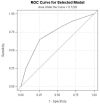Survey on Tuberculosis Patients in Rural Areas in China: Tracing the Role of Stigma in Psychological Distress
- PMID: 28976922
- PMCID: PMC5664672
- DOI: 10.3390/ijerph14101171
Survey on Tuberculosis Patients in Rural Areas in China: Tracing the Role of Stigma in Psychological Distress
Abstract
Depressed patients had risks of non-adherence to medication, which brought a big challenge for the control of tuberculosis (TB). The stigma associated with TB may be the reason for distress. This study aimed to assess the psychological distress among TB patients living in rural areas in China and to further explore the relation of experienced stigma to distress. This study was a cross-sectional study with multi-stage randomized sampling for recruiting TB patients. Data was collected by the use of interviewer-led questionnaires. A total of 342 eligible and accessible TB patients being treated at home were included in the survey. Psychological distress was measured using the Kessler Psychological Distress Scale (K10). Experienced stigma was measured using a developed nine-item stigma questionnaire. Univariate analysis and multiple logistic regression were used to analyze the variables related to distress, respectively. Odds ratios (ORs) and 95% confidence intervals (CIs) were used to present the strength of the associations. Finally, the prediction of logistic model was assessed in form of the Receiver Operating Characteristic (ROC) curve and the area under the ROC curve (AUC). According to the referred cut-off point from K10, this study revealed that 65.2% (223/342) of the participants were categorized as having psychological distress. Both the stigma questionnaire and the K10 were proven to be reliable and valid in measurement. Further analysis found that experienced stigma and illness severity were significant variables to psychological distress in the model of logistic regression. The model was assessed well in predicting distress by use of experienced stigma and illness severity in form of ROC and AUC. Rural TB patients had a high prevalence of psychological distress. Experience of stigma played a significant role in psychological distress. To move the barrier of stigma from the surroundings could be a good strategy in reducing distress for the patients and TB controlling for public health management.
Keywords: K10; psychological distress; scale; stigma; tuberculosis.
Conflict of interest statement
The authors declare no conflict of interest.
Figures
References
-
- Tang Y., Zhao M.G., Wang Y.X., Gong Y.H., Yin X.X., Zhao A.G., Zheng J.J., Liu Z.Y., Jian X.F., Wang W.X., et al. Non-adherence to anti-tuberculosis treatment among internal migrants with pulmonary tuberculosis in Shenzhen, China: A cross-sectional study. BMC Public Health. 2015;15:474. doi: 10.1186/s12889-015-1789-z. - DOI - PMC - PubMed
MeSH terms
LinkOut - more resources
Full Text Sources
Other Literature Sources
Medical
Research Materials


